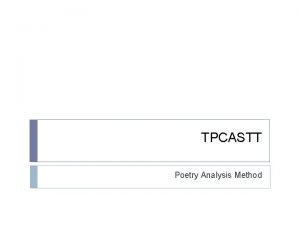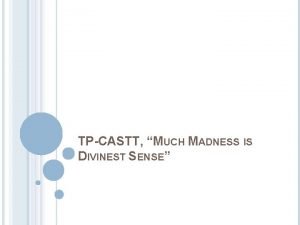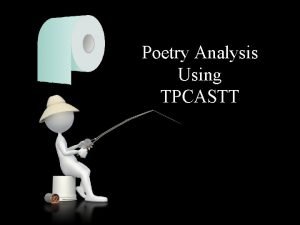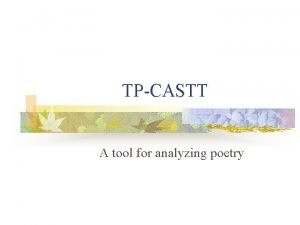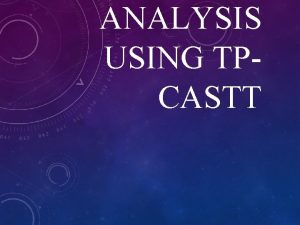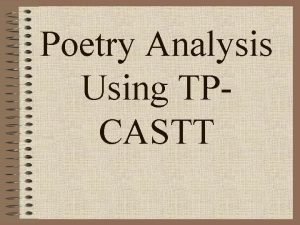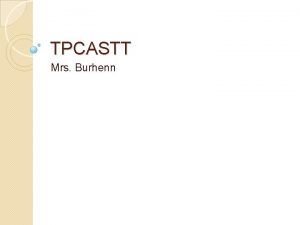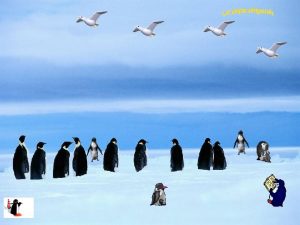TPCASTT PAPA PAPA Purpose What is the point














- Slides: 14

TP-CASTT & PAPA

PAPA • Purpose: What is the point the work is trying to convey? • Audience: Who would this work appeal to the most? • Persona: This is usually the narrator but if you don’t have a narrator who would be saying this? • Argument: What argument is the piece making? – If I do something or I know something then something will happen. • SOT: Through (source) readers learn (argument/purpose).

Poetry Terms • Imagery: Anything that appeals to the five senses. – Sight, Sound, Taste, Touch, Smell • Simile: A comparison of two things using the words like or as. – Her hair was black like the feathers of a crow in winter. • Metaphor: A comparison of two unlike things without using the words like or as. – Her hair was the black feathers of a crow in winter. • Personification: Giving nonhuman things human characteristics. – The tree danced with the grace of a ballerina in the wind • Symbol: When an ordinary object stands for something beyond itself. – A flag is just a piece of cloth but it represents a country’s individuality. • Rhythm: A repetition of sound paterns – Ba duh, ba duh • Meter: The pattern of stressed and unstressed syllables.

TPCASTT • Title: Ponder the title before reading the poem • Paraphrase: Translate the poem into your own words • Connotation: Contemplate the poem for meaning beyond the literal level • Attitude: Observe both the speaker’s and the poet’s attitude (tone). • Shifts: Note shifts in speakers and attitudes • Title: Examine the title again, this time on an interpretive level • Theme: Determine what the poet is saying

• A Poison Tree – William Blake • Look at the title and attempt to predict what the poem will be about.

A Poison Tree – William Blake • I was angry with my friend: I told my wrath, my wrath did end. I was angry with my foe: I told it not, my wrath did grow. And I watered it in fears Night and morning with my tears, And I sunned it with smiles And with soft deceitful wiles. And it grew both day and night, Till it bore an apple bright, And my foe beheld it shine, And he knew that it was mine And into my garden stole When the night had veiled the pole; In the morning, glad, I see My foe outstretched beneath the tree. • Paraphrase the literal meaning or “plot” of the poem. A true understanding of the poem must evolve from comprehension of “what’s going on in the poem. ”

A Poison Tree – William Blake • I was angry with my friend: I told my wrath, my wrath did end. I was angry with my foe: I told it not, my wrath did grow. And I watered it in fears Night and morning with my tears, And I sunned it with smiles And with soft deceitful wiles. And it grew both day and night, Till it bore an apple bright, And my foe beheld it shine, And he knew that it was mine And into my garden stole When the night had veiled the pole; In the morning, glad, I see My foe outstretched beneath the tree. • For poetry, connotation indicates that students should examine any and all poetic devices, focusing on how such devices contribute to the meaning, the effect, or both of a poem. Students may consider imagery (especially simile, metaphor, personification), symbolism, diction, point of view, and sound devices (alliteration, onomatopoeia, rhythm, and rhyme).

A Poison Tree – William Blake • I was angry with my friend: I told my wrath, my wrath did end. I was angry with my foe: I told it not, my wrath did grow. And I watered it in fears Night and morning with my tears, And I sunned it with smiles And with soft deceitful wiles. And it grew both day and night, Till it bore an apple bright, And my foe beheld it shine, And he knew that it was mine And into my garden stole When the night had veiled the pole; In the morning, glad, I see My foe outstretched beneath the tree. • Having examined the poem’s devices and clues closely, you are ready to explore the multiple attitudes that may be present in the poem.

A Poison Tree – William Blake • I was angry with my friend: I told my wrath, my wrath did end. I was angry with my foe: I told it not, my wrath did grow. And I watered it in fears Night and morning with my tears, And I sunned it with smiles And with soft deceitful wiles. And it grew both day and night, Till it bore an apple bright, And my foe beheld it shine, And he knew that it was mine And into my garden stole When the night had veiled the pole; In the morning, glad, I see My foe outstretched beneath the tree. • • Rarely does a poet begin and end the poetic experience in the same place. Discovery of a poet’s understanding of an experience is critical to the understanding of a poem. Trace the feelings of the speaker from the beginning to the end, paying particular attention to the conclusion. Look for the following to find shifts: – – – – 1. Key words (but, yet, however, although) 2. Punctuation (dashes, periods, colons, ellipsis) 3. Stanza division 4. Changes in line or stanza length or both 5. Irony (sometimes irony hides shifts) 6. Effect of structure on meaning 7. Changes in sound (rhyme) may indicate changes in meaning 8. Changes in diction (slang to formal language)

A Poison Tree – William Blake • Examine the title again, this time on an interpretive level.

A Poison Tree – William Blake • I was angry with my friend: I told my wrath, my wrath did end. I was angry with my foe: I told it not, my wrath did grow. And I watered it in fears Night and morning with my tears, And I sunned it with smiles And with soft deceitful wiles. And it grew both day and night, Till it bore an apple bright, And my foe beheld it shine, And he knew that it was mine And into my garden stole When the night had veiled the pole; In the morning, glad, I see My foe outstretched beneath the tree. • Create a PAPA for the poem then… • Identify theme by recognizing the human experience, motivation, or condition suggested by the poem. – Through (title), (author) explains to (audience) that (argument/purpose)

• • • Introduction to Poetry Billy Collins I ask them to take a poem and hold it up to the light like a color slide or press an ear against its hive. I say drop a mouse into a poem and watch him probe his way out, or walk inside the poem's room and feel the walls for a light switch. I want them to waterski across the surface of a poem waving at the author's name on the shore. But all they want to do is tie the poem to a chair with rope and torture a confession out of it. They begin beating it with a hose to find out what it really means.

Journal • Do you ever feel like you are one person for your parents, one for your friends, one for being at school, and one for everyone else? What is the effect of this on you? Do you think this will go away as you get older? Why or why not?

We Wear the Mask by Paul Dunbar • WE wear the mask that grins and lies, It hides our cheeks and shades our eyes, — This debt we pay to human guile; With torn and bleeding hearts we smile, And mouth with myriad subtleties. • Why should the world be over-wise, In counting all our tears and sighs? Nay, let them only see us, while We wear the mask. • We smile, but, O great Christ, our cries To thee from tortured souls arise. We sing, but oh the clay is vile Beneath our feet, and long the mile; But let the world dream otherwise, We wear the mask! • Create a TPCASTT with your group for this poem
 Warren pryor poem meaning
Warren pryor poem meaning Robert t. kiyosaki gazdag papa szegény papa
Robert t. kiyosaki gazdag papa szegény papa Hình ảnh bộ gõ cơ thể búng tay
Hình ảnh bộ gõ cơ thể búng tay Frameset trong html5
Frameset trong html5 Bổ thể
Bổ thể Tỉ lệ cơ thể trẻ em
Tỉ lệ cơ thể trẻ em Voi kéo gỗ như thế nào
Voi kéo gỗ như thế nào Chụp phim tư thế worms-breton
Chụp phim tư thế worms-breton Hát lên người ơi alleluia
Hát lên người ơi alleluia Kể tên các môn thể thao
Kể tên các môn thể thao Thế nào là hệ số cao nhất
Thế nào là hệ số cao nhất Các châu lục và đại dương trên thế giới
Các châu lục và đại dương trên thế giới Công thức tiính động năng
Công thức tiính động năng Trời xanh đây là của chúng ta thể thơ
Trời xanh đây là của chúng ta thể thơ Mật thư anh em như thể tay chân
Mật thư anh em như thể tay chân















